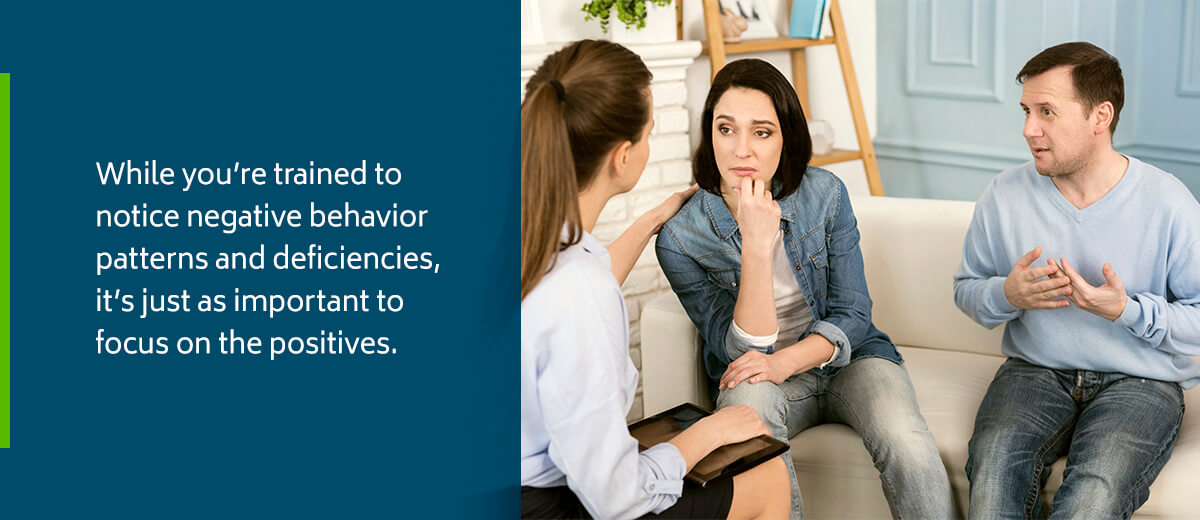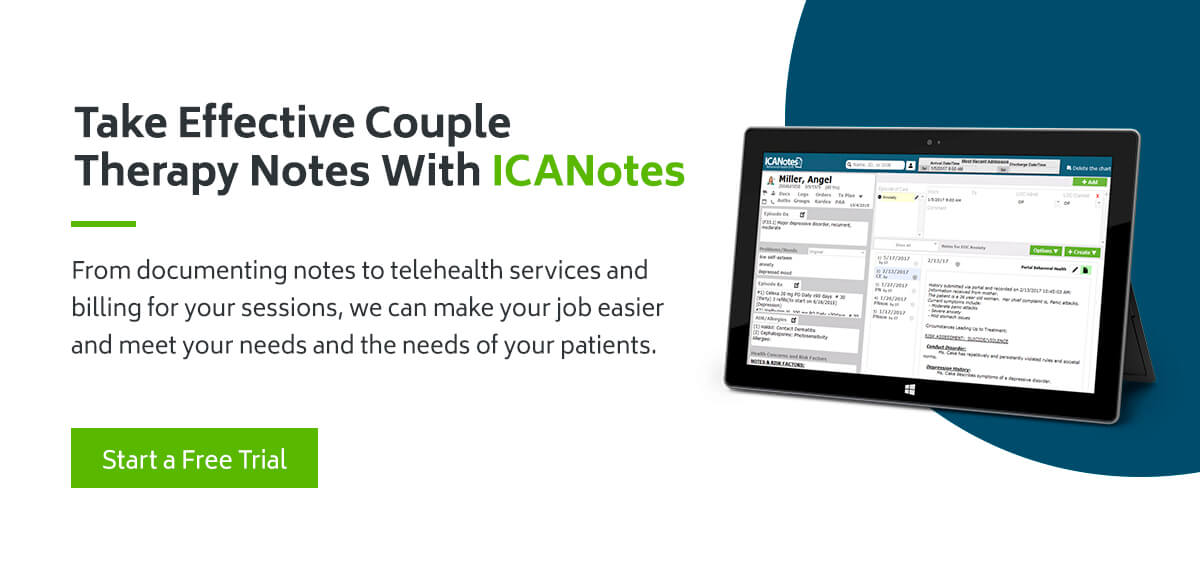
14 Tips for Effective Couple Therapy Sessions
Your role as a therapist is to maximize the value of your sessions, break ineffective patterns and help your couple identify better means of communication and support. With the right tools, you can provide your couple with the necessary skills and knowledge to become better individuals and better partners for each other.
Working with two people often means focusing on many more objectives than in one-on-one therapy. You may also experience your couples arguing, talking over one another, or focusing on negative issues. Here are some therapist tips for couples therapy to help your sessions become more productive.
The 14 Tips
- Set Realistic Expectations
- Remind Each Person to Focus on What They Can Do
- Emphasize the Progress They’re Making
- Do Not Keep Secrets From the Partners
- Facilitate One Growth Area in Each Session
- Practice Skills Taught in Each Session
- Develop a Clear Treatment Plan
- Keep Emotions Calm
- Make Sure Couples Stay Respectful
- Focus on Problem-Solving Skills
- Stay Friendly and Positive
- Explore Early-in-Life Experiences
- Keep the Couple From Focusing on Criticizing
- Prompt the Couple to Remember Positives
FREE DOWNLOAD: Therapeutic Interventions and Resources for Couples Therapy

1. Set Realistic Expectations
Setting realistic expectations can help your patients feel that their relationship is a work in progress rather than something you can “fix.” Some partners may be using therapy to demand a change in their partner and expect to see results immediately. However, it’s your job as a therapist to help your patients see that couples therapy is a long-term process rather than something they can strictly control. Seeking therapy is a means for fostering growth and healthy behaviors, not changing a person.
Other types of unrealistic expectations include:
- Hoping the therapist will take sides and agree with one partner over the other.
- Assuming the therapist will improve the relationship immediately.
- Believing they only need to talk about their partner’s faults and areas of improvement.
Determine your patients’ expectations early on to help avoid disappointment. Remind them that couples therapy is about seeking understanding and resolutions rather than venting or complaining. Remember, you’re not an advocate for either partner over the other but an advocate for their relationship’s health.
2. Remind Each Person to Focus on What They Can Do
It’s essential to periodically remind each partner in couples therapy that change starts with themselves. Both partners contribute to issues in the relationship and both need to realize the importance of working from within. It can be challenging to achieve that collaboration if partners deny their role in relationship issues. Seeing the other person as the problem rather than focusing on teamwork will only impede their progress.
Here are some questions you can ask if you experience this issue in couples therapy:
- Do you spend more time focusing on your partner’s actions than your own?
- Do you blame your partner for things that you both have responsibility for?
- Do you communicate about anger and resentment or avoid it after conflict?
- Do you have a desire to change your partner but not yourself?
- Do you notice patterns or cycles of the same recurring issues?
When one patient focuses on fixing the other instead of working on themselves, they immediately lose the opportunity to work together and become opposing teams.
3. Emphasize the Progress They're Making
Highlighting their progress each session can be a great way to help a couple shift to a positive mindset. While it may take a few visits to establish clear goals and expectations, you can keep your patients motivated by emphasizing their effort.
Start your sessions by asking each partner what they would like to address in their visit and end by establishing how they can work toward that goal. This structure can help keep your patients focused on specific objectives. Working on those objectives outside of their time with you can help keep them aware of their own progress.
You can also give your patients feedback on how they’re learning, changing, and growing every time they share something positive about reaching their goals. Reminding them of their progress, no matter how minor it may be, will help maintain the optimism between both partners.
4. Do Not Keep Secrets From the Partners
Therapists should never keep information from one of the participants in couples therapy, even if it’s a sensitive topic.
One partner may want to speak with you privately about something they’re keeping from the other person, such as an affair, addiction, family issues, or doubts about the relationship. However, knowing that one of your patients is lying or keeping information from the other will make it difficult for you to effectively conduct your couple’s therapy. Sharing information with only one couple member will prevent both partners from addressing issues in a place of safety and trust.
It’s vital to set clear expectations and boundaries about this in your first session. Before diving in, make it clear that you can’t keep secrets from either one of your patients unless they wish to speak privately about how to tell the other person in the next session.
As a therapist, you should always uphold transparency and impartiality with your patients. Allowing any patient to discuss matters with you outside of couples therapy can make the other partner feel left out or ganged up on, making them less receptive to treatment and creating more trust issues.
5. Facilitate One Growth Area in Each Session
Focusing on one growth area with each visit can help your couple feel that they’re making consistent progress. A couple should feel the pressure of negative feelings toward each other easing with every session as they work toward upgrading their communication skills and breaking negative habits. You can help accelerate this growth by focusing on one primary concern each session or finding different solutions to a particular obstacle.
Collaborative dialogue can reduce hostility and conversational dominance between partners. It can also help them focus on what they want from the relationship rather than complaints and criticism of their partner. Try having your couple use collaborative dialogue statements like “I feel…” and “My concerns are…” to help them focus on what they want out of the session.
6. Practice Skills Taught in Each Session
Building and practicing skills within a session can make it easier for a couple to use them at home. Once you identify specific areas to focus on, tell your couple how they can practice those skills in therapy and as they work on their relationship independently.
As a therapist, you can point the way to new behavior patterns by providing the right approach. While it may take some time for your patients to apply what they’ve learned and see progress within themselves, it’s important they know how to practice what they learn.
7. Develop a Clear Treatment Plan
Having a clear course of treatment and knowing your couple’s end goals will help you stay on track throughout your sessions. If your patients drift off-topic or bring up something unrelated when they’re feeling targeted, remind them of their goals and the specific actions to help them reach that destination.
It’s important to remember that as the therapist, you have control of the sessions. Always work to keep the discussion moving forward in a useful direction. Clear direction will help your patients feel more productive than going around in circles over the same unresolved conflicts.
8. Keep Emotions Calm
It can be challenging to navigate your therapy session when heightened emotions lead to screaming, crying, arguing or name-calling. Therapy is an opportunity for couples to make themselves vulnerable and express their feelings. However, this vulnerability can also lead to an emotional intensity that makes it difficult to focus on anything productive.
Keep control of the session by teaching both partners couples therapy techniques for staying calm. Encourage them to talk through their feelings instead of lashing out or raising their voices. When emotions are high, remind your patients that they can maximize their session by focusing on collaborative dialogue rather than participating in mutual accusations.
9. Make Sure Couples Stay Respectful
In addition to staying calm, it’s critical for each patient to remain respectful even when talking about sensitive topics or experiencing moments of anger. While therapy is the place to express these issues, there should be clear rules about how the partners talk to each other.
One partner using inappropriate language can deter the other person from listening or engaging, derailing the progress of an entire session. While each person deserves to feel that you’ve heard and understood their point of view, they also both deserve respect and acceptance.
10. Focus on Problem-Solving Skills
Teaching partners how to problem-solve will help them navigate their relationship issues both in session and at home. Although many patients may expect you to fix their relationship overnight, your job is to provide them with the means to find their own solution. While you should offer suggestions if a couple has trouble coming up with ways to work on their problems together, it’s ultimately up to them to find the best path forward.
It can be challenging for many patients, especially couples, to set aside negative behaviors like nagging, accusing or blaming and focus on growth and change. As a therapist, you can help them find ways to work together to resolve disagreements and conflicts as a team.
11. Stay Friendly and Positive

Many people may be reluctant to begin couples therapy or resist opening up and each partner wants to feel liked and heard without feeling that you prefer their partner over them. While you’re trained to notice negative behavior patterns and deficiencies, it’s just as important to focus on the positives. Try to keep your tone warm and welcoming to create a positive environment and remain friendly with each patient.
Telling your patients what you think they do well in their relationship and what’s going right for them can help make them more willing to open up during therapy. Keep in mind that while they’re coming to therapy for a reason, they may have struggled to take this step. Try to keep your sessions as motivating and uplifting as possible.
12. Explore Early-in-Life Experiences
Asking questions about each partner’s earlier life experiences can give the other person a clearer understanding of circumstances that might have led to their current behavior or difficulties. Their answers will also help you paint a better picture of what their life was like prior to entering this relationship and understand how their earlier years might affect their ability to maintain a romantic relationship.
Early family experiences can affect your ability to problem-solve and advocate for your needs in later romantic relationships. Childhood and early life experiences can alter someone’s willingness to be emotionally vulnerable. Distance from inner experiences and avoidance of negative emotions can also make a patient afraid of opening up and incapable of handling challenging topics.
While these reactions can make the first few couples therapy sessions a challenge, it’s important to make both partners feel safe. Be patient with them as they struggle to embrace difficult emotions.
13. Keep the Couple From Focusing on Criticizing
A vital part of couples therapy is teaching your patients to stop telling their partner what they want them to do differently or how they need to change. While criticism and accusations are common in relationships, helping them understand and discuss each issue allows both partners to express their feelings and concerns. Once they can do so, each partner should be able to ask themselves what they can do to help solve those issues.
Consistent verbal negativity like criticism, defensiveness, contempt, and speech interruption can help you determine how your couple interacts on a daily basis. Try to guide your patients away from negative communication and telling each other what to do and help them focus instead on how to be responsive to their partner’s needs and concerns.
14. Prompt the Couple to Remember Positives
Encouraging your patients to focus on the positive parts of their relationship can lead to a reduction in fault-finding and an improvement in their understanding of one another. Many couples may have been together for so long by the time they start therapy that they can’t remember what drew them together or what made them want to stay together through the years. Have your couple describe memories of positive communication or times when they’ve worked through a problem together successfully.
Having a couple look back on their relationship can help them learn from their mistakes and realize what their strengths are both individually and as a couple. Encouraging nostalgic memories in a romantic relationship can help increase relationship satisfaction and positive feelings as the couple reminisces on the past that bonds them together.
Take Effective Couple Therapy Notes with ICANotes
As someone who works in behavioral healthcare, you can always benefit from an easier, automated process that improves your workflow and enhances your quality of care. With ICANotes, we offer a robust, comprehensive behavioral health EHR with features designed to improve efficiency and allow you to spend more time focusing on your patients.
From documenting notes to telehealth services and billing for your sessions, we can make your job easier and meet your needs and the needs of your patients. Whether you’re looking to improve your practice management or boost your compliance and security, our software includes plenty of capabilities and features to help you grow your practice.
Start Your Free Trial Today











